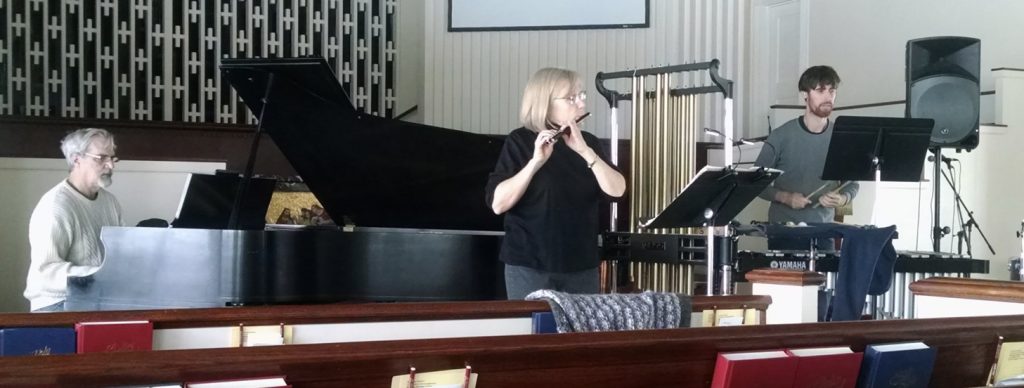by Daniel Hathaway

Titled “Ah, Humanity,” the concert began with Peterson’s 17-minute Drones, a work the composer told the audience had been four years in gestation and represented his first use of pre-recorded electronics.
The backstory is the long-fought war in Afghanistan, which Peterson noted has gone on for 19 years at a cost of $2 trillion. Specifically, he wrote in his notes, “Drones is my attempt to convey the senseless violence, cruelty and destruction carried out by these weapons of war.”
The four movements include “Jannah,” the Islamic equivalent of heaven, “The dark, cold box in the desert,” a journalist’s description of a drone control station in Nevada, “Hellfire,” or a standard air-to-surface missile for unmanned drones, and the self-explanatory “Endgame.”
The musique concrete composition begins appropriately with low-pitched electronic drones and jangly sounds out of which instruments emerge — flute and piccolo (Mary Kay Fink), clarinet (Robert Woolfrey), violin (Kim Gomez), cello (Linda Atherton), piano (Nicholas Underhill), and percussion (Dylan Moffit). Women’s voices and — eventually — military crosstalk enter the mix.
A jolly, folksonglike flute tune joins snare drum, and a piano din raises the temperature of the piece, which then subsides. Violin harmonics and clarinet lead to an increasingly ominous drum roll that suddenly stops in its tracks. Drum beats, mallets, and shouts from the winds wrap up the narrative.
Peterson controlled the well-integrated electronics from a laptop, and Ty Alan Emerson led a tight performance by the live musicians. Drones made a strong initial impression, suggesting more details would be revealed in a second hearing.
You don’t often hear Beethoven’s Heiliger Dankgesang without the surrounding movements of the Op. 132 string quartet, but Gomez, Emma Shook, Lisa Boyko, and Atherton made a good case for a standalone performance of the piece. (The program note associated its genesis with the composer’s Heiligenstadt Testament rather than with his recovery from a near-fatal illness.) The performance was well-paced and the changes of mood from contemplative to ebullient were nicely managed.
Piccoloist Mary Kay Fink met Israeli composer Oded Zehavi when he was in Cleveland for the “Violins of Hope” events in 2015 and persuaded him — and The Cleveland Orchestra — that a piccolo concerto commission would be a great idea.
Sunday evening’s performance, supported by piano (Underhill), percussion and tubular bells (Moffitt), gave a taste of what we’ll hear at Severance Hall at the end of April. Accessible and engaging, Aurora gives Fink abundant opportunity to show the range of emotion and color the highest-pitched member of the woodwind section can put across.
Debussy’s sole string quartet might have seemed like an afterthought on the program, but Gomez, Shook, Boyko, and Atherton dug into it with soulful panache. The program note pointed out that both the composer and his contemporary, Claude Monet, were much affected by the Great War. “For these men, creating art was more than escape. It arose from a deeply felt need to restore the world to harmony and balance…” Bravo to that.
Published on ClevelandClassical.com March 17, 2020.
Click here for a printable copy of this article



